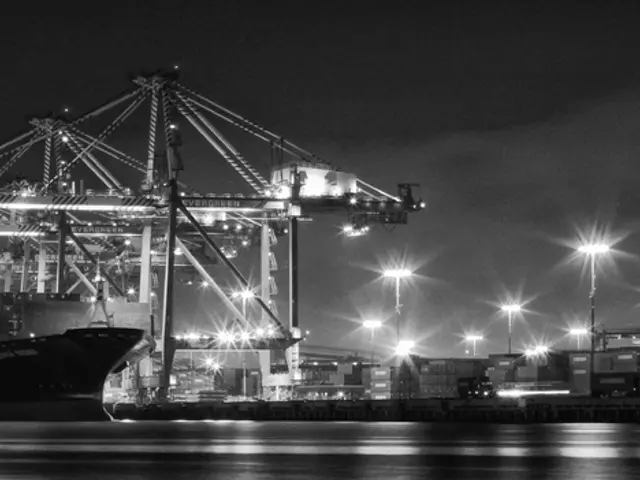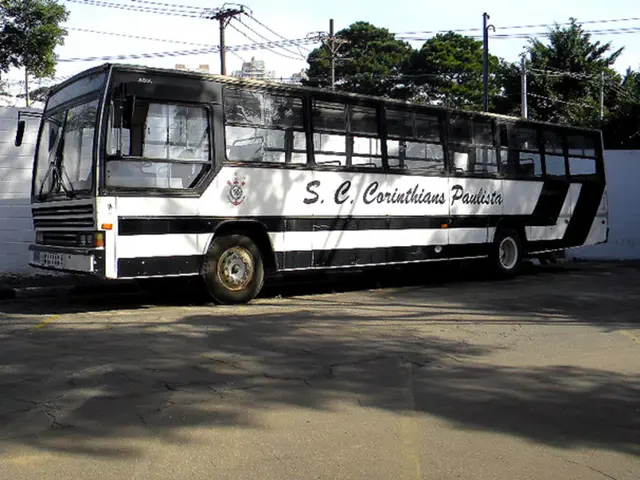Motorway Overcrowding: Tidal Waves of Trucks Swamping Germany's Highways
Auto club voices concern over traffic congestion, particularly for trucks - Insufficient space for lorries or trucks.
Germany's motorways are struggling under the weight of thousands of trucks, revealing a serious traffic hazard, according to the Auto Club Europa (ACE). In a recent analysis, ACE identified an alarming shortage of truck parking spaces, especially on busy highways like the A4 and A38.
From April 15 to June 3, ACE conducted an evening count of trucks parked on motorways, focusing on the Berlin Ring (A10) and the A24 in Mecklenburg-Vorpommern. These areas exhibited the highest risk due to improperly parked heavy goods vehicles, leading to potential accidents and gridlock.
For instance, Eichelborn Nord on the A4 in Thuringia showed an alarming 60% overcrowding, and Galgenberg Nord on the A38 was only slightly better at 58%. However, Hermsdorfer Kreuz West remained relatively safe.
Last year, the regional management of the federal motorway company highlighted the frequent overutilization of facilities, particularly on the east-west axes A 4 and A 38. Similarly, the Thuringian regional association of the transport industry is urging the construction of more truck parking spaces.
ACE's Snapshot of Eastern Germany's Parking Nightmares
Although the ACE's truck count is but a snapshot, it revealed dire situations at 31 checked rest areas across eastern states. A total of 2,168 parked trucks were counted, exceeding the available parking spaces by almost 50%.
Several rest areas, particularly those visited during night hours with limited visibility, posed concrete traffic hazards, with trucks often parked in entrance and exit lanes.
A survey by the Federal Highway Research Institute in 2023 revealed a shortage of over 19,500 regular truck parking spaces nationwide[2]. The Federal Association of Goods Transport, Logistics and Disposal estimates the number to be around 40,000 lacking spaces. However, around 3,000 parking spaces have been added since 2018, according to the Federal Ministry of Transport.
- Motorway
- Car
- Traffic
- Rest area
- Auto club
- ACE
- Overcrowding
- Germany
- Thuringia
- Potsdam
- Dresden
- Auto Club Europa
- Mecklenburg-Western Pomerania
Insights:
- The shortage of truck parking spaces in Germany stems from insufficient infrastructure, slow expansion, and the upcoming transition to electric vehicles requiring more space for charging infrastructure[3].
- The lack of parking spaces poses several risks to traffic safety and efficiency, including safety concerns, traffic congestion, environmental impact, and economic consequences[4].
- To alleviate these issues, the German government plans to invest €400 million over four years, focusing on creating new parking spaces and improving existing ones with telematics solutions[5]. Additionally, creating parking facilities outside of motorways might prove more cost-effective[6].
The Community Policy and Employment Policy must address the urgent need for infrastructure expansion to alleviate the shortage of truck parking spaces on Germany's highways, especially considering the upcoming transition to electric vehicles and the associated requirement for charging facilities. The finance industry should collaborate with the transportation industry and the automotive sector to devise long-term solutions for this critical issue.
Industry associations, such as the Federal Association of Goods Transport, Logistics, and Disposal, have estimated that the lack of truck parking spaces may amount to around 40,000 spaces nationwide, posing significant risks to traffic safety, efficiency, and the overall economics of the German transportation sector. Therefore, it is essential for policy makers to prioritize the construction of additional truck parking spaces as part of their employment and industry policies.








